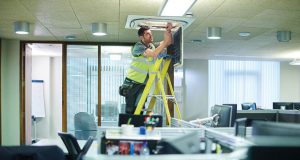 By Toby Feldman, Marketing Executive at Infraspeak
By Toby Feldman, Marketing Executive at Infraspeak
As I wandered around the Facilities Show 2023 in the ExCeL Centre, London, chatting to managers from companies big and small, I asked people: “What is the biggest challenge impacting your operations right now?” They’d respond along the lines of: “Hiring! Absolutely. It’s really, really hard to fill vacancies at the moment”
Immediately, I put on my investigative hat and set out to try and find out mo.re. The results are, to say the least, quite interesting.
At first glance, a vacancy in FM doesn’t seem like it would be hard to fill. This market is projected to nearly triple in size, from $42 billion in 2021 to $109 billion by 2028, with a remarkable annual growth rate of over 12 per cent. It is an industry driven by innovation and technology, enabling new and exciting developments.
A quick search will show London-based vacancies for Heads of Estates paying upwards of £70,000, and Fire Door Inspectors paying over £50,000. This isn’t exactly loose change, is it? Peel back the glistening sheen and you’ll see an industry facing something of a hiring crisis.
Recent research found that 84 per cent of interviewed companies have vacancies they are struggling to fill, ranging from entry-level technicians to C-suite executives. This problem is showing no immediate signs of abating, and indeed, at the current pace, it will get worse before it can improve. There are major challenges that may play into the talent gap.
The Flexibility Gap
This refers to expectations that staff have in today’s world of work, and the possible misalignment that our industry offers in common packages. Seventy Six per cent of people want flexible working hours, but is our industry matching expectations? Are you still “office only”?
During the pandemic, we saw the positive impact of having more control over work schedules on wellbeing, quality of life, and happiness. While some tasks require on-site presence, modern technology allows flexibility for many others. Employers can accommodate this by:
- Adopting a “remote first” policy, allowing staff to work from anywhere as long as on-site presence isn’t necessary.
- Covering travel expenses as a standard policy to show empathy and compensate for commuting time.
- Providing perks like company cars, generous vacation and bonus allowances, as well as opportunities for the team to socialise in person.
The Age Gap
The FM industry has gained a reputation as an “old person club,” and this perception is not entirely unfounded. The average age of an FM manager is 51, and 23 per cent of FMs have over 20 years of industry experience. What message does this convey to young talent starting their careers? Are they even considering FM as a viable option?
FM and service companies need to do more to attract and support this younger generation of talent, especially considering that up to 30 per cent of the current workforce will retire by the end of the decade. Churn is coming, and you need to be ready.
Invest in young talent now and prioritise candidates with degrees in FM. It doesn’t make sense to risk losing the knowledge they’ve acquired at university by favouring candidates solely based on experience, which might discourage them from pursuing a career in the industry.
Diversify the training approach for young starters to create a positive experience. This can include training courses, shadowing opportunities with experienced team members, and exposing them to dynamic work events like industry shows, team socials, and retreats to foster a sense of connection.
The Appearance Gap
How can we make candidates truly see how awesome our company is? Solutions include increasing flexibility and aligning compensation packages with industry expectations, embracing young talent and providing them with opportunities to grow.
We need to change people’s perception of the industry. In the facility and maintenance management world, prospective employees want access to the best technology. There are IMMPs on the market that allow them to work centrally and collaboratively, and they’ll be attracted by the proposition. This is critical — offering your staff and prospective employees the right tech changes the perception of your company and allows you to position yourself as a true market leader.




